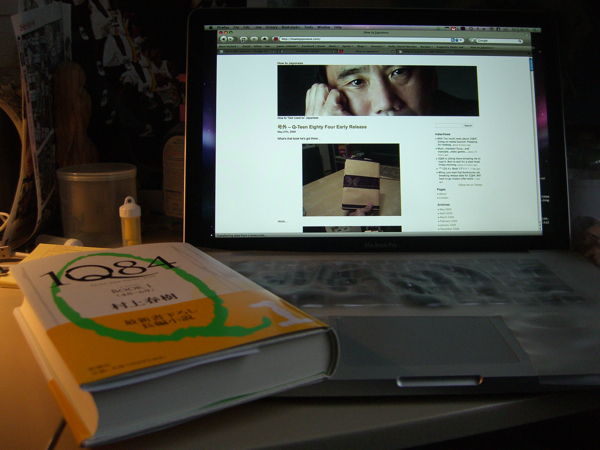
During my third year of college, my Japanese literature professor invited me to cheer on Haruki Murakami at the Boston Marathon with his departmental literature class, a class I’d taken the year before. The small group of us went in a few cars over to Heartbreak Hill, the brutal rising slope towards the end of the marathon course. We got there and watched the runners pass by, numbers and names written on their arms and shirts, as they trudged, walked and ran through the last few miles of the race. Murakami eventually approached, we cheered, and he ran off with a confused look on his face – it was a great day.
In the car on our way to the race, the professor said something that I’ve kept somewhere in my head for a long time now – six years to be exact. He said, “What we’re doing doesn’t make sense, but we’re not doing it because it makes sense.” This seems like an appropriate time for them to come floating back to me – what I’m about to do doesn’t make sense, but I’m not doing it because it makes sense.
I will be doing it well, though. I’m equipped with a nice Islay single-malt, a choice selection of beer, and a rainy weekend giving me the perfect excuse to sit inside and read. For food, I have some snacks to tide me over, but I’ll go knock off the local McDonald’s for some bread later tonight. Yes we パン!
So sit back, relax, give your whisky a swirl, and check after the break for 1Q84 liveblog madness all weekend (or until my eyeballs fall out).
Friday
5:56 Good morning, Tokyo! I’m sorry if my fanboy squeals have awoken you. I’m up. Going to have breakfast and take a shower before I start reading.
While you’re waiting, take a moment to salute the ultimate Murakami fanboy: Yoshio Osakabe. His website devoted to Murakami is an amazing resource, especially the two lists of Murakami’s complete works (in Japanese only). The first is from the late-70s to 1992, and the second is from 1992 to the present. His list is the ultimate Murakami bibliography, and I think reading through it is one of the few ways to realize exactly how prolific Murakami has been over the last 30 years. The list includes everything Murakami has ever written: movie reviews, short stories, novels, interviews, and even two articles from jazz magazines a good 3-4 years before he ever started writing fiction. I highly recommend putting on some quiet jazz, cracking open a beer, and spending a few hours just reading through them. They are fantastic.
6:50 It begins! Quote from “It’s Only a Paper Moon” opens the book.
**MASSIVE DISCLAIMER**
Everything written here is unofficial in nature and is in no way affiliated with Murakami himself. Any translations other than those cited from other sources are my own interpretation of the original text and should not be quoted/misconstrued as the official translation. Also, please note that any translations are being produced live as I read the book. Be gentle.
6:58 I don’t plan on translating all that much, but just for fun, here’s a possible translation for the first sentence: “The taxi radio was playing an FM classical music program.”
7:00 Sentence 2 = Damn you katakana; damn you Russian classical composers.
7:03 Pardon me. Czech classical composer. Leoš Janáček’s “Sinfonietta.”
7:09 Green Peas? Greenpeas?
7:13 Beer spotting. Pilsner in Czechoslovakia being imagined by main character.
7:21 OK, weird. I don’t want to give too many spoilers, but this is just a little weird. The main character of this first chapter is a girl named Green Peas. She’s supposed to be from a small town or village in the mountains of Fukushima Prefecture, which is exactly where I spent three years teaching English. “…in the small towns and villages of those mountains, there were supposed to actually be several people with the name Green Peas. However she herself hadn’t yet been there” (12-13).
I never met any kids named Green Peas. My favorite kid names? Ramu (pronounced “Rum”) and his sister Memu. They were cool.
7:26 Her dad is from Fukushima.
7:34 青豆, by the way, is just more proof that there are blue/green issues in Japan. (See comments here.)
7:45 It’s a magical taxi?
7:50 Just a Toyota with really good sound isolation. (Err…insulation.)
8:00 Just learned a new word for mysterious – 不可解 (ふかかい). With Murakami you can never know too many.
8:14 Green Peas has clearly never heard of the Den-en Toshi Line. (This is hilarious, I promise.)
8:37 Great sentence: 「録音された拍手を長く聞いていると、そのうちに拍手に聞こえなくなる。終わりのない火星の砂風に耳を住ませているみたいな気持ちになる。」 This is spoiler free: “Listen to the recorded applause for a long time and it stops sounding like applause. It makes you feel like you’re hearing the endless, sandy winds of Mars.” Some of the perspective in this first chapter is hard to sort out. Easy enough to understand in the Japanese, but probably a couple of possibilities in translation.
8:52 Mark it, dude. Page 25. Girl with strange ears.
9:08 Track 2, Billy Jean.
9:26 Whew, Chapter 1 finished. 47 more to go. So far it’s all third person other than the dialogue. Judging from the first sentence of Chapter 2, that part of the book is also in third person. I don’t know why, but the third person narrator feels more “present” for me. This could just be because it’s Japanese. I’ll have to rethink that sentence from 8:37 later on.
Quick break for tea.
Note to self: If you keep reading at this pace, it’s going to take 300 hours to read the book. Read faster.
9:38 And to be fair to the main character of the even-numbered chapters, the first sentence of Chapter 2: “Tengo’s first memory was from when he was one and a half” (30).
9:39 Whoa, R-rated first memory.
9:40 Just got pwnd by Treyvaud who pointed out that it was “sandstorm” (砂嵐) not “sandy winds” (砂風, a nonexistant word probably). 漢字!
10:03 I think the main issue I’m having in terms of perspective is reading all the 〜だろう sentences as strictly third person. They feel more first person. I am far from a linguist, so please suffer through my inadequate explanation: だろう (darou) and the おう/ろう verb ending imply either 1) future tense, 2) probability of something occuring. For whatever reason they feel more first person to me. Hmm. Although I guess that’s what storytelling is? Talking about somebody else. I guess rather than “first person” I should say that it sounds like someone is reading the story like the narrator in The Big Lebowski, except he/she is never revealed.
10:24 Ahh, reading the first few pages of Chapter 2 is like slipping into a Murakami time capsule. Digging the memory/mind theme. My first memory? Snow at my uncle’s house somewhere in New Mexico. I must’ve been 3 or 4.
10:55 Seen 圧倒的 (あっとうてき) quite a few times already. “Overwhelming.”
11:07 Interesting choice of topic in Chapter 2. Two characters talking about selection of a literary prize, somewhat similar to the one that Murakami won for Hear the Wind Sing. As far as I can remember, he’s never written about something like this before. Sure, he’s written about writing, but not about prize selection. First few pages also remind me of his story “Baseball Field” from Dead Heat on a Merry-go-round for some reason. Probably because the characters talk about writing in that story.
11:11 Dammit, I never should have listened to “Paper Moon.” Stuck in my brain.
11:36 Advice through his characters: “Enjoying the act of writing is more important than any other qualification for people aiming to be writers” (39).
11:41 Should also include the next two lines: “But that’s not enough?” “Of course. That alone is not enough. They also need to have that ‘special something.’”
He could be using this as a setup to knock down later. Will be interesting to see where it goes.
12:01 Cool kanji – 文壇 (ぶんだん). It means the literary world, specifically the people that edit/write for the big magazines in Japan. Murakami has long been known to keep himself separate from it, making him almost a hermit in his own country. He’s very outgoing abroad, though, and gives a lot of talks, does signings. In the recent monkey business interview (pg 66-67), he says he does this to promote Japan culturally (not out of patriotism) from the position he’s earned. Anyway, the 文壇 is a theme in Chapter 2.
12:03 Ah, Green Goddess, you never fail me. 軽侮 = contempt.
12:28 Quick break for end of basketball game. Looks like The Lebrons will live to play Game 6.
12:56 “A Mont Blanc fountain pen with blue ink and 400-character manuscript paper. As long as he had those, Tengo felt satisfied” (47).
Interesting that Murakami puts a fountain pen in his character’s hand, as that’s what he used to write his first couple books. He went and bought one along with paper after being inspired to write at a baseball game in 1978. The paper is standard Japanese writing paper. All of the kids use it in school. You can set a Japanese word processor to type in the format, and it’s still used today to measure the length of stories. (On the cover of Japanese literary magazines you can often see hype like 「54枚!」 which means 54 sheets.)
Murakami says that for Kafka on the Shore he wrote 10 pages a day. (monkey business pg 63) He doesn’t say 400-character sheets specifically, but assuming that they were standard sheets, that makes roughly 4000 characters a day. There are approximately 2.2 characters per English word, a calculation used by lots of freelancers and translation companies, which means just over 1800 words a day. He finished the whole writing process – writing 1800 pages and revising it down to 1600 – in 9 months.
And on that note, lunch break.
13:20 Cup Noodle, consumed. Just a note that all monkey business cites refer to the same volume as cited in this post.
13:31 Boom! End of pg 47. This book might have just gotten a little bit harder to translate. Very interesting. You’ve got two years to get familiar with this, and you might even want to check out this.
14:29 Finished Chapter 2! 46 remain.
I enjoyed this chapter more than the first. Overall the pacing was better, and I think more happened. (Although this is Murakami we’re talking about, so not all that much happened.) At first the content seemed more like classic Murakami, but then it took a turn into da Bundan (文壇), a previously unexplored area for Murakami. (Unless you include “The Rise and Fall of Sharpie Cakes” from Blind Willow, Sleeping Woman.) Both chapters feel like the narration from the third person sections of Kafka on the Shore and parts of Afterdark.
A couple of other notes:
– chapter titles so far are coming straight from lines of the text
– Chapter 3 is back with Green Peas, so they do alternate, one of Murakami’s favorite devices
– oh, Green Peas in Japanese is romanized as “Aomame”
– my eyeballs hurt
14:45 Chapters 1 and 3 take place somewhere in this vicinity. This is the highway. 池尻 (Ikejiri) is the next exit, and Green Peas is stuck somewhere between it and the previous exit.
15:21 Considering what Murakami has already said and the title of the book, I don’t think it’s too much of a spoiler to say the book is set in 1984. This isn’t clear until Chapter 3.
15:53 Or is it?
16:30 Bunches of this pattern, too: (X skill/technique/ability)が具わっている。Have/be equipped/(maybe even “Gifted with”) with X skill/technique/ability.
16:38 The awesomeness level of the odd-numbered chapters just went up a good bit on pages 71-73. I won’t spoil it, but it beats the Bundan.
16:59 Chapter 3, done. Murakami takes his sweet time getting to the action. I guess that’s always been a criticism, but it’s so much more apparent when you read it in the Japanese. Even the quick parts take longer to read, so the slow parts feel even slower.
Very curious to see where these odd chapters go. I’m not convinced I should be sympathizing with the main character’s line of work just yet. Murakami could’ve spent more time telling us why we should, although maybe he will before too long.
The dora-yaki I ate at lunch is slowly bashing my attention span with giant mallets covered in soft foam, which means it’s time for a power siesta. Back in a bit.
18:08 Ohayo-sama! Back on the horse. Chapter 4.
18:33 Cool kanji – 朗報 (ろうほう). “Good news.” Reading this word was, for me, one of those miracles of studying Japanese; I was able to pronounce the word and knew from the 報 basically what it meant in context, but I still didn’t know the exact meaning. 漢字, I forgive you.
18:45 やれやれ count – 2 times so far, I believe. I’ll start paying closer attention. やれやれ, pronounced yareyare, is one of Murakami’s pet phrases. Usually it’s his boku narrator using it to describe something that happened to him. Something semi-unfortunate and uncontrollable, and this is his ironic way of say, fantastic. You could also translate it as a kind of a sigh of resigned acceptance. This is a pretty funny picture that popped up when I searched for it on Google Images. Japanese don’t often do the shoulder shrug – it’s considered very American (foreign in general?) – but maybe やれやれ would induce one.
18:51 Ha, here‘s the link to more great robot photos. Other than the やれやれ one, this is my favorite.
19:16 I’ll never get how they decide what to 変換 and what not to. I’ve seen はかり知れない as well as 測り知れない. (Apologies to Japanese-ily Challenged Individuals. This is a blog about Japanese, after all.)
19:48 It’s パン time. I’m off to McDonald’s. Currently on page 90 of 554 of Book 1. 泣
21:02 Thoughts over dinner:
– One more やれやれ. The count is now 3.
– There’s also quite a bit of 惹かれる (ひかれる). It’s come up at least a half dozen times, probably more than that. It means to be attracted to, drawn in to. Murakami uses it to express that sort of fate-like lack of control that makes his characters tick-tock.
– There’s a character sort of like Nakata from Kafka, who has a unique way of talking. Just made me think of how flexible Japanese can be with stuff like this. For many words, there are three different ways to write them – two phonetic ways (hiragana, katakana) and then a kanji (+ katakana/hiragana) if the word requires it. Add in homonyms, and it seems like there’s a lot you could do with miscommunication between people. Maybe they got bored of this a long time ago.
21:15 Time to break out the booze! For whisky, I went with Bowmore, one of the distilleries Murakami visited when writing his book 『もし僕らのことばがウィスキーであったなら』 (If Our Words Were Whisky).
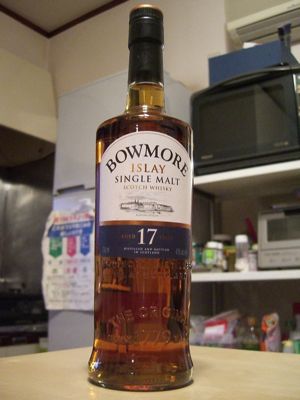
Interestingly, Bowmore is now owned by the Japanese company Suntory. Murakami calls Bowmore the “great dividing range” (35) of the seven Islay single malts because it’s so balanced; it separates the lighter whiskies from the more pungent ones like Laphroaig and Ardbeg. Here’s one of my favorite passages from the intro:
If our words were whisky, I wouldn’t have had to work so hard, of course. I’d hand you the glass, and you’d take it and quietly send it down your throat – that would be the end of it. Very simple, very intimate, very accurate. However, our words are words, and they can only live in the world as words. When we tell stories, we replace all things with some other more sober things and then can only live within those limits. But sometimes for a brief, fortunate moment there is an exception, and our words really do become whisky. And we – or and least I – live dreaming of those moments. Dreaming of what would happen if our words were whisky. (12-13)
There are actually some very similar passages in 1Q84. Here’s a taste from one of the characters:
“When I write fiction, I use words to change the scenery around me into something more natural. In other words, I re-form it. That way I can confirm that I, as a person, definitely exist in this world” (89)
Mmm…peaty.
21:59 Done with Chapter 4! 44 left. Just over 100 pages in, which means I’ve read 1/10th of the book. やれやれ。
Pretty good so far. Starting to move a little faster, too. Still, there are only four real characters in the book. Not quite as many as I would have predicted given Murakami’s definition of a “comprehensive novel” (see my post from Wednesday). Still, there’s quite a bit of the novel to go.
22:12 Music from Chapter 5. Nat King Cole’s singing “Sweet Lorraine.” That version is great – it features the Oscar Peterson Trio and Coleman Hawkins. There are more versions on YouTube. Definitely worth a listen.
22:36 Pg 104. More 惹かれる. This time to old men with thinning hair?
22:40 Cutty Sark siting – pg 105.
22:49 4th やれやれ.
23:03 Time to crack open a cold one. Buying this beer was a no-brainer. Why? Check out the label:
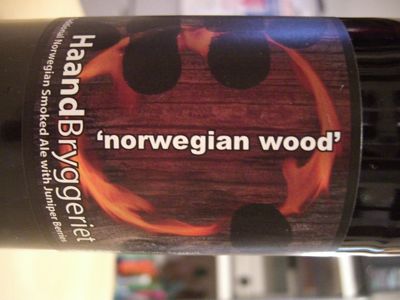
I went into the store with the intention of picking up only a bottle of scotch, but I decided to browse – a dangerous activity at Tanakaya, the best beer store in Japan.
I was familiar with Haandbryggeriet – the Norway-based “Hand Brewery” – from their Norwegian sour ale. When I leaned over to peek at the beers on the shelf and saw “norwegian wood,” I knew I had to buy this beer. It happened to be the last bottle. (I was back this past Thursday and saw that they had more on the shelf.)
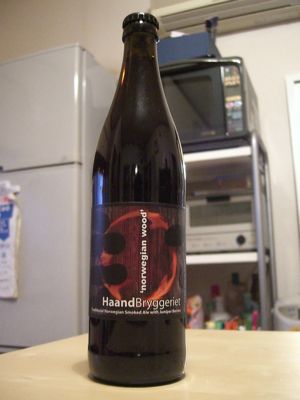
It’s another traditional Norwegian style – smoked beer flavored with juniper berries. Almost all beer used to have a smokey essence because the malt was roasted over open flame. At some point people figured out how to divert the smoke, and now only a few styles keep the flavoring, notably the rauchbier style.
This is a cool bootleg of “Norwegian Wood.” Maybe not a bootleg exactly, just a bit of extra stuff before?
The beer is top notch.
Saturday
0:08 Whew. Done with Chapter 5. Still no hints about what the title might mean other than the year 1984, but there were a few clues that may prove Prediction 3 correct. Prediction 1 was a gimme, and so far Prediction 2 has held up. 4 and 5 will have to wait.
1:10 The characters have stopped making sense, so I think it’s time to call it quits for the night. I’ll be up tomorrow morning and reading/blogging again. I think it’s safe to assume that I’ll start up again 7-9 hours from now.
What a great day. Excited to keep reading tomorrow.
8:16 Time for hippie breakfast (muesli + yogurt) and more Murakami.
8:33 Reference to Stanley Kubrick’s Paths of Glory. In Japanese the title is 突撃 (とつげき), which literally means “attack” or “charge.”
10:03 Hard kanji – 憂鬱 (ゆううつ). It means “melancholy, depression, gloom.” That second character has 700 strokes.
10:07 Damn, Murakami makes adultery sound so pleasant.
10:46 Done with Chapter 6. One of my roommates asked if there have been any sandwiches or cigarettes yet. No sandwiches. Maybe a few cigarettes? Can’t remember. The two main characters don’t smoke. Alas, gone are the days of the boozy boku.
11:06 A weird kanji that I’ve seen quite a few times, as well as once or twice in the monkey business interview, is 抽斗. I had to ask the roommates how it’s pronounced, but apparently it’s ひきだし, just the basic word for “drawer.” It’s used literally in 1Q84, but in the interview (pg 59), Murakami uses it as a metaphor. He says writers shouldn’t spend too much time writing essays because it uses up the “drawers” (抽斗) where they keep the things they’ve “felt.” Murakami wrote more essays and reviews when he was younger, but now he says he wants to “save them up” (‘them’ being his drawers) for longer works of fiction.
I can’t get 抽斗 to 変換 from ひきだし for the life of me. (If you can understand that last sentence, you are awesome, too.)
12:11 Two more characters introduced in Chapter 7. Interesting stuff. Being hit by a wave of tiredness. Time for rally sushi. (Also known as 割引すし from the supermarket last night.)
13:21 What if I told you there’s a character who is an assassin not dissimilar from the one in No Country For Old Men? Is that something you might be interested in?
13:39 Done with Chapter 7. “Lawyers, Guns, and Money” might have been an appropiate name, but the real title was “Very quietly so you don’t wake the butterflies.” Man, that took it out of me. Brief siesta.
14:20 Up. Chapter 8.
14:22 What if I linked to the video I should’ve linked to earlier? Is that something you might be interested in?
14:37 Some great sections in Chapter 8 about NHK collection men. Avoiding them is a national pastime here. For a while I thought it was just a foreigner thing. Good reads here and here.
15:04 Short sections on World War II in Chapter 8. Still unclear if it will be as big a theme as in Wind-up Bird.
15:40 I don’t have to feel guilty about opening up a beer early because it’s Saturday. After buying one bottle of Norwegian beer, I couldn’t go and let the other Norwegian brewery get jealous.
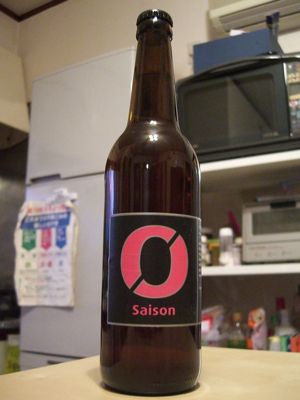
Nøgne Ø seems to be a solid young brewery. They have great design (all their bottles are decorated simply with “Ø” and the style of the beer), brew a wide range of styles, have connections with other brewers all over the world, and they’re also aiming to be the first European brewer of nihonshu. There are some great videos (ep 1, ep 2) from when the head of Stone Brewing went to visit the owner of Nøgne Ø. Norway looks absolutely pristine.
I’ve only ever had their barleywine, a beer called “#100,” the 100th recipe (batch?) they brewed. This time I went with a saison to see what their take on the style is. Saison, often called a Belgian farmhouse ale, has long been popular in Belgium and Europe – places where they make proper beer – and it’s starting to become a regular on the American craftbrewing scene as people search for something (anything!) that isn’t HOBAR – hopped beyond all recognition. Belgian yeasts are magical little creatures and should be left to do their work uninterrupted for the most part.
The beer isn’t bad. Not as bubbly as I was expecting and actually pretty hoppy compared to some other saisons. Still, tasty.
16:07 Another word I’ve picked up in the last two days – もつれる. Murakami always has it in katakana, but apparently 縺れる is the other way to write it. It means “tangle, entagle, to be/get into a tangle.”
17:24 Finished Chapter 8 just a few minutes ago. Dug the first part of the chapter but it slowed down towards the end. Started to get some historical discussion, possibly scene setting for whatever insanemadness goes down in the rest of the book.
I’m off to Oktoberfest in Hibiya Park. What? It’s only April? Well, yeah, but for whatever reason Hibiya Park puts on Oktoberfest twice a year. I’m off in search of Fujizakura’s Märzen, some decent sausages and, of course, lederhosen. Check out that link for my thoughts on the Oktoberfest last year plus some untranslated Murakami. I’ll be reading on the train ride and hopefully will have some insightful (read: not too thoroughly sloshed) thoughts for you when I return.
22:15 I made it back from Oktoberfest. On the walk to Hibiya Park from Shimbashi Station, I saw a casualty. Man down, man down!:
I managed to get myself there to order a half-liter of Fujizakura märzen and the Deutsche Plate (meat!) which we later discovered was meant for 3-4 normal persons. (Or 1 metaphysically hungry Murakami maniac.)

After talking with my buddies Tomoda Ginzo and Mrs Mopp (see comments), we generally agreed that so far 1Q84 feels a little overwritten. Ironic considering parts of the book detail an editor carving away the unnecessary bits of a story. Hopefully there will be big payoff later in the novel.
I’ve just poured myself a cup of green tea, so hopefully I’ll be able to get through a bit more tonight.
22:48 Page 194: “Green Peas closed her eyes and pressed her temples firmly with her fingertips.”
A couple of the characters have this habit. I might develop it depending on how the book turns out.
23:54 When I studied abroad, my literature professor kind of dismissed Murakami by saying “he writes to be published abroad.” Well, damn, all I can say is if that’s true, he’s not making it easy on the translators with the title selection for this book. It gets explained: “1Q84 – that’s what I’ll call this new world, decided [character X – REDACTED FOR SPOILER REASONS, heh]. Q is the Q from ‘question mark.’ That which creates a question” (202).
I feel like Murakami writes really only to please himself, not a specific market.
Sunday
0:45 Now some characters are all the way out at this station.
0:57 Boo. I’m tired. Just over 200 pages in. Back again in 7-9 hours for the last day of liveblog.
8:30 Ohayo-sama! Green tea and more Murakami.
8:52 There have been an almost unprecedented number of pregnant silences: “When he listened closely, Tengo felt like there were some kind of implications in that stillness” (210).
9:13 Well, he’s made it easier for translators here: 「英語でいえばfield of savagesだ。」(212)
9:17 And we finally have a surname: Tengo Kawana (川奈天吾). Green Peas is, I believe, her surname. So that’s Ms. Green Peas to you.
10:33 Pg 222. Minor Orwell reference. The first one, I think.
10:35 Another miracle of language study: I could pronounce and understand 自給自足 without ever having seen it before. “Self-sufficiency.”
11:34 Done with Chapter 10! That was a long one, especially towards the end. 38 chapters left to go. My new reading strategy is to try not to peek at how long each chapter is. I feel like they go faster when I’m not paying attention.
11:59 It’s very important not to confuse 踊る and 蹴る at the beginning of Chapter 11.
13:17 For whatever reason, that first chapter of the day really takes it out of me. I’m back from a nap and mini-lunch with a cup of puerh tea. Ready to attack.
13:21 Reference to On the Beach, post-apocalyptic novel/movie set in Australia.
13:32 Murakami getting truthy: “However, needless to say, there’s no way Sean Connery would show up at a pseudo-Bahama style singles bar in Roppongi” (238).
13:36 やれやれ number five! This time induced by a bad series of music videos at a bar: when the Queen song ends, ABBA comes on.
15:02 Done with Chapter 11. Another character introduced, so with the addition of one in 10, there are eight characters so far. A couple of other minor ones, too.
Rain started dumping just a minute ago. Debating when to hit the booze. One more chapter, methinks.
15:29 Crazy pronunciation – 公にする, prounced おおやけにする. To make public/publicly known.
In other news, I’m on pg 260, which is right about a quarter of the way through.
16:46 Lots of words for hesitate, too. ためらう, 躊躇 (ちゅうちょ). For the most part, the chracters are not hesitating.
17:03 Done with Chapter 12. No topics on the Aum yet, but religion does come up. Will be interesting to see where he takes it. One question I’d like to see someone answer (maybe someone at Mutantfrog?) is why do so many houses in Japan have signs with Christian quotes on the side? I haven’t seen too many in Tokyo, but they were all over the town where I spent three years. Always the same color pattern – dark brown with yellow lettering. They said things like “The blood of Christ forgives all” or “He died for our sins.” Can’t seem to find a picture anywhere. (Update: Matt provided this link in the comments.)
Tengo ends the chapter with a glass of Wild Turkey, which reminds me…
17:48 In Chapter 13, Green Peas wakes up with a wicked hangover. The perfect segway for me to quote this bit from the monkey business interview (the dashed lines are the interviewer):
—When I drink now, it always stays in my system. So when I’m wrapped up in a long work, I try not to drink so much so that I don’t feel it the next morning.
Never once in my life have I been hungover, had a headache, or had stiff shoulders [thanks to drinking]. Everyone says they’re painful, but I have no idea what they’re actually like.
—Well…I’ve had all of them. (laughs) When I see you, Murakami-san, I think that the most important thing to a writer is ultimately a healthy body.
Yes. A healthy body that houses an unhealthy spirit. (laughs) (9-10)
I have to call bullshit here. Murakami went to a Japanese university. He ran a jazz bar for a long time. He wrote a book about scotch. He must’ve gotten boozed up at some point. Gotta love that last line, though.
18:01 Here’s what the monkey business issue looks like in case anyone is after a copy:
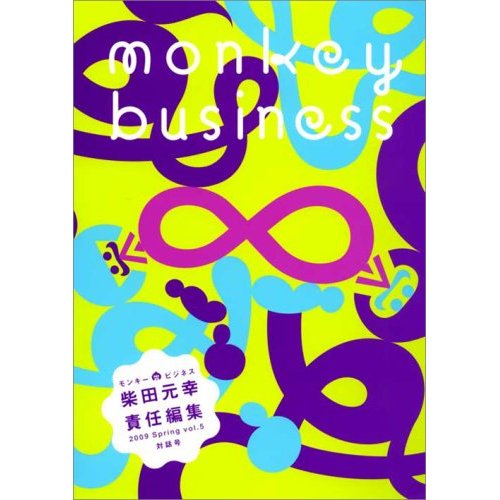
18:37 Time for the final beer of the liveblog – a big bottle of Duvel, a stealthily drinkable Belgian golden ale. Nice and bubbly, perfect for celebrating.
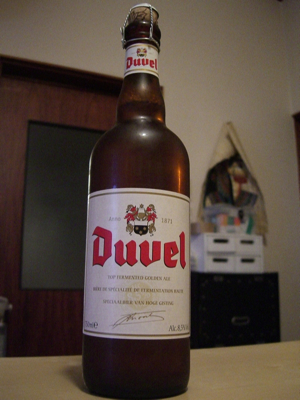
And a celebration this is! Murakami’s first epic novel in 7 years! ’85 (Hard-boiled Wonderland and the End of the World), ’94-’95 (Wind-up Bird Chronicle), ’02 (Kafka on the Shore), and now ’09 for giant Murakami novels. I guess you can say he’s 2 for 3 with anything over 400 pages so far. Pretty amazing how he writes them on seven year intervals.
This beer is what champagne should taste like. Remember, champagne is unnecessary.
18:51 Some recorder sonata action up in Chapter 13. No specifics except for harpsichord and recorder together. This one is pretty good.
20:19 Whew. Chapter 13 was intense. Lots of sex and death. Heavy stuff. Page 303 of 554. Let’s see if I can fit in one or two more chapters tonight. Just finished the Duvel, which will make the exercise a wee bit more difficult.
22:15 Duvel…slowly…sucking ability….to read…kanji…
23:13 Done with Chapter 14, and this is as good a place as any to wrap this liveblog up.
It’s been great to read a new Murakami. While he makes use of one of his favorite devices to frame the novel (two stories in alternating chapters that may or may not have some connection), 1Q84 feels very different from anything he’s written before. He’s addressing certain topics (Japanese literary world) that are brand new. It’s entirely third person, but it doesn’t feel like Afterdark. In his recently published interview, Murakami talked about the technique he used in Afterdark:
I haven’t told this to anyone yet, but I was using a special writing style to get that [the narrative techniques of Afterdark that combine third-person and first person plural]. I always write the dialogue and other sentences in the order that I think of them all the way until the end of the book, but with Afterdark, first I wrote through just the dialogue. I went with just the dialogue, something like a script. (41)
As for new techniques in 1Q84, none are immediately apparent other than being entirely in third person. If I had to compare 1Q84 to one of Murakami’s previous works, I’d have to say the short story “Tony Takitani” comes closest. As in that story, he’s combining the daily lives of several characters with broad swaths of Japanese history. Whether or not this is effective won’t be clear until the end of the book. At this point it feels like the book is possibly over-long. We shouldn’t forget that even in masterpieces like Hard-boiled Wonderland and the End of the World, Murakami went off on long tangents about random things he had researched (like unicorns).
Part of the over-long-ness is due to the time-tested Murakami technique of having his characters wait for mysterious moments. While they’re listening to music, thinking about old memories, or their attention happens to be somewhere else, the world around them has changed into a different form. Murakami had this to say about 9/11 in the monkey business interview:
This world we are living in now [the post-9/11 world] has less reality than an imaginary or theoretical world. (48-49)
He went on a lot longer in the interview, but that quote gets to the point the quickest. I believe this will tell a lot about the novel, although, to be perfectly honest, that line could describe almost any of his novels or stories.
So thanks for tuning in! I’m sure I’ll be posting other Murakami-related material in the near future, so be sure to check back in. Hopefully I’ll be able to finish up reading this book in the next 2-3 weeks. I also plan on posted short untranslated bits of Murakami as we get closer to the Nobel Prize announcements in October. Proabably once a month from June or July and then once a week in September. I appreciate all the comments and hope I haven’t spoiled anything – I was trying very carefully not to.
Now it’s time for bed. I have to go to work tomorrow. やれやれ。(I’ll be taking Monday off. Normal content resumes on Wednesday.)

Pingback: How to Japanese» Blog Archive » 1Q84 English Translation Liveblog
Pingback: Murakami’s latest is a big disappointment | A Models
Pingback: Tazaki Tsukuru and the Amazing Technicolor DREAM Liveblog! | How to Japanese
Pingback: Japanese Reading Material to Get Your Skills to the Next Level | FluentU Japanese
Pingback: More Drawers | How to Japanese
Pingback: Last Line | How to Japanese